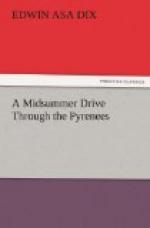It takes little time to convince us that Bareges deserves all the abuse it has received. We came unprejudiced and in a sympathetic mood, willing to defend the much-reviled; but we admit to each other that the revilers have only erred on the side of timidity. The pall of the place is unmistakable and wraps us in completely; even a genial party and determined high spirits are slowly forced to succumb. There seems something gruesome about it; the curious burden is not to be shaken off, try as we may.
The village is sorrowfully set, to begin with; the valley here is high and more gloomy even than below; the narrowing hills, grey-black or a sickly green, stand and mourn over their own sterility. Though it is daylight still, the sun has long passed behind them, and the air is chilled and mouldy. The village is merely one long, shaky street crouching in along the side of the mountain; it is lamentably near the torrent, for the rough Gave de Bastan just below is one of the scourges of the Pyrenees, and each spring it tears by and even through the street, and scours down the valley, swollen and resentful, causing discouraging damage along its track. Many of the houses are taken down each fall and re-erected in the summer; and as we walk on through the street, these quavering shanties of pine combine with the jail-like appearance of the heavier stone buildings and the harsh hills and clouds around, all in a strange effect of utter repellence.
But it is the people we meet who intensify the impression. No one visits Bareges for pleasure; its extraordinary springs are the sole reason of its existence, and only those who must, come to seek health in them. Sad-faced invalids, who have tried other baths in vain and have been ordered hither as a last resort; wounded or broken-down soldiers; cripples, who stump their crutches past us down the earthen road,—these are the ones who haunt Bareges, anxious and self-centred and unhopeful. Style and fashion are things apart; there is not a landau to be had in the place, and scarcely a smaller vehicle. In cold or storm, the sick hurry from boarding-house or hotel to the bath-establishment in close-shut sedan-chairs; on fairer days, they limp their own way thither. Talk turns on diseases; there is no fresh news, Bareges is a long ride from the news bearing railway; the discussions begin with this or that spring or symptom and end in a disconsolate game at ecarte.
Truly disease is a hideous visitant to the fairness of life,—a hard interruption to its store of joys.
Beyond all this, however, there is a something further about Bareges,—this incubus of depressingness, seemingly the very soul of the spot. Sickness and dreary location will account for it in part; but many have felt that certain subtle spirit pervading a region or even a single house, which in part defies analysis; it is in the air; it overhangs; it may be light and joyous and animating, or forbidding. And Bareges is a striking instance; morbid, abhorrent, funereal, there seems here some influence at work which is not entirely to be accounted for, yet to which it is impossible not to yield.




